Hector: The Chopin of Twist
When yé-yé exploded across France in the wake of the twist, it pretty much steamrollered
everything in its path, including, ironically enough, the harder-edged rock 'n' roll that had originally been its inspiration. By mid-1963, both Les Chats Sauvages and Les Chaussettes Noires were without their original singers, Vince Taylor's career had gone into freefall and even Johnny Hallyday was being berated for following Elvis Presley's lead and "selling out to girls". But not everyone was willing to play the yé-yé game...
Following time-honoured tradition (well, honoured for a year or two, anyway), Parisian rock 'n' rollers Hector et les Médiators made a name for themselves at leading teenage nightspot Le Golf Drouot with a stage act drawn directly from rough and tumble American rock 'n' roll - usually sung in heavily accented English. Although almost all of the leading French rockers had sung in their native language on record, out in the clubs things were much more varied and many, many performers won themselves a local following delivering often garbled, nonsensical approximations of English, a style that, in typical derisory fashion, critics came to label "yaourt". Les Médiators were better at it than most, and they certainly looked convincing, but they were never going to become stars without some sort of gimmick to help them stand out from the pack. They didn't need to look any further than their lead singer...
Born Jean-Pierre Kalfon (and absolutely not to be confused with the actor of the same name), Hector had ridiculously long hair, well before The Beatles broke open the French market, and a finely tuned sense of the ridiculous to go with it. For Hector, rock 'n' roll was exciting, certainly, a release from the day to day grind, but it was also a joyous explosion of fun, laughter and insanity. While other singers sought to become the French answer to Gene Vincent, Elvis Presley or Cliff Richard, Hector was a man apart, although his appeal was not that different from UK oddball rockers like Wee Willie Harris or Screaming Lord Sutch. Although to begin with he dressed fairly conventionally, things would change soon enough.
After making a name for themselves at La Guitare d'Or talent content in June 1963, the band signed with Philips, providing the label with a demo of two songs they had recorded a few weeks earlier. "Tchang" was a decent instrumental that showed off the band's musical chops, while a cover of Eddie Cochran's "Something Else" showed off Hector's best "yaourt" delivery. it was no classic, but the label rushed it out on a jukebox 45, and also on an EP shared with Les Hot Kings (two tracks apiece).
The band were not impressed and the record didn't exactly set the charts alight. Two more tracks were hastily recorded for a second single, this time pushing Hector to the fore on covers of Buddy Holly's "Peggy Sue" and Jerry Lee Lewis' "Whole Lotta Shakin' Goin' On". They were nothing to write home about - certainly not when compared to the American originals - but they did allow Hector to get his personality across, albeit within the limitations of his accented vocals. Records were however a secondary concern to the live shows that were building the band a following across Paris, both for their ferocious assaults on the rock 'n' roll songbook and, much more noticeably, for Hector's increasingly bizarre antics on the stage.
Taking a leaf out of Lord Sutch's book, Hector had begun arriving for shows in evening dress, accompanied by a valet, Jérôme, who would accompany him onstage, wiping his brow and helping to give the impression of Hector as an aristocrat slumming it in the world of rock 'n' roll, earning himself the nickname "the Chopin of Twist" from a bemused press (despite the fact that he never, ever recorded a twist tune). Suited and booted, Hector would careen around the stage like a madman, while Jérôme would tidy his appearance between songs and very much play the role of a faithful servant. Sadly, Jérôme was absent from the scene when Hector filmed a Scopitone video to promote the song, but the clip does give a good idea of what the singer looked like in action.
What Hector really needed was some songs that went with his increasingly crazed attire. The solution came when he teamed up with actor and comedian Jean Yanne, who penned the lyrics for two French slices of rock 'n' roll lunacy - "Je vous déteste" and "T'es pas du quartier". Where most French hits of the day were conciliatory reflections of the world of les copains (pals), Hector's would be darker, more aggressive and hilariously funny. Paired with the two rock 'n' roll classics from the single, these appeared on his next EP, the two sides of the record each reflecting a side of the singer's extrovert personality. It all went down a storm at Le Golf Drouot, and on concert stages around the country, but radio had no idea what to do with him. Airplay was patchy, at best, and the record died a commercial death.
Some sense of what the singer was like onstage can be gleaned from his appearance in the film Cherchez l'idole, a cheap cash-in on the yé-yé phenomenon starring pretty much everyone who was anyone (Johnny Hallyday, Sylvie Vartan, Les Caussettes Noires, Frank Alamo etc) with a soundtrack written by Charles Aznavour and Georges Garvarentz. Quite how Hector came to be included is anyone's guess but he got to strut his stuff through a version of "Il faut saiser sa chance", a song that had been a hit for Hallyday a couple of years earlier. With white gloves to complement his evening dress, he storms out across the stage before trashing the music stands in a disinterested fashion (has there ever been a lazier demonstration of Who-like autodestruction? At least a year before the Who did it, too... before leaping onto the piano and laughing hysterically like Vincent Price on steroids and then, to cap it all, wading out into the crowd. Surely yé-yé wasn't meant to be like this?
Hector was clearly something else, but Philips had no idea how to handle him. Furious that the company had mixed his new comic numbers with traditional rockers on his last EP, he sued his record company for release before signing with the Ducretet Thomson label, for whom he made what is cut for cut his best record, thanks in part to legendary producer Ken Lean, who conjured up sounds that perfectly supported Hector's artistic vision. Issued in 1964, the new EP offered four French language songs, all adapted from American sources to suit the singer's madcap personality. "La femme de ma vie" was a tasty slice of rhythm 'n' blues freely based on The Animals' recent "Gonna Send You Back To Walker" but the highlights were two tracks lifted from his spiritual ancestor, Screaming Jay Hawkins. The horns that powered "Hong Kong" looked forward to the coming soul boom but Hector's delivery of both this and the downright creepy "Alligator" (adapted from "Alligator Wine") was anything but soulful. Wild, certainly, even demented, perhaps, but nobody would ever mistake Hector for a soul singer.
It is hard to imagine such a record ever becoming a hit, even today, and despite a major promotional campaign by the singer, it flopped. Not even a widely-reported (and near sacrilegious, to some) attempt to fry an egg over the flame at the Tomb of the Unknown Soldier (below the Arc de Triomphe) was enough to generate record sales. Never taking anything seriously, Hector was the original "rebel without a clue" and while he remained a popular live draw (he supported The Animals later in 1964), he quickly parted company with his label. In 1965, he toured the Middle East, and event which seems to have inspired a bad taste cover of Ray Stevens' "Ahab The Arab" (nobody would dare make a record like that today) for Polydor. The rest of the record seemed like business as usual, but tucked away at the end was a decent cover of Otis Redding's "I've Been Loving You Too Long", sung with what almost sounded like sincerity, suggesting that Hector might be able to make it into the pop marketplace after all.
Sadly, it wasn't to be. The record flopped and Hector took off for Canada in the company of former Chat Sauvage, Mike Shannon, who was by then trading as George Brummel. Hector produced a number of Quebecois hits for Brummel (and for a variety of local acts) in the late sixties before returning to France to cut a final single in the company of former soul duo Tom et Jerry, with Dick Rivers in the producer's chair, before giving the game away completely. He died in 2020, never having achieved stardom, but not seeming to care too much either. For the Chopin of Twist, it was never about the glory - it was always about the fun.
You can read more about Hector - and much more besides - in my book. Feel free to grab a copy here: BOOK

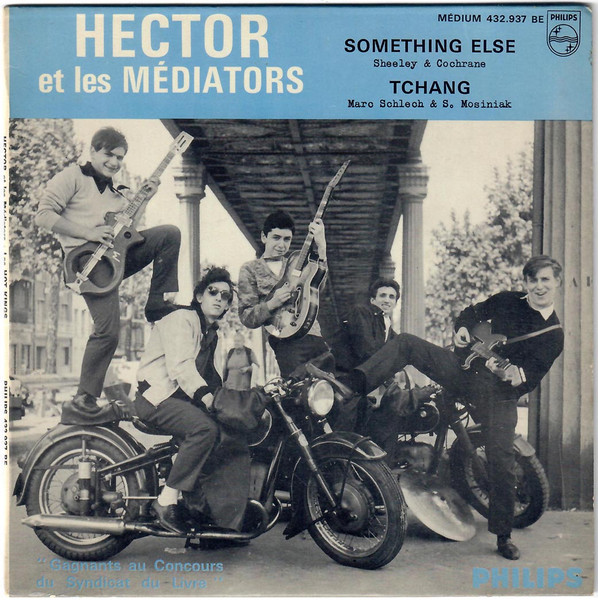
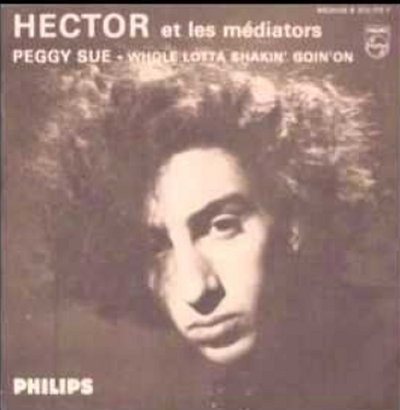
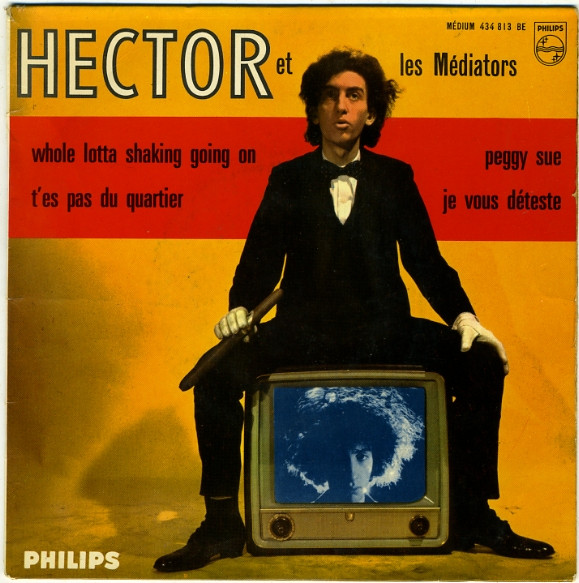


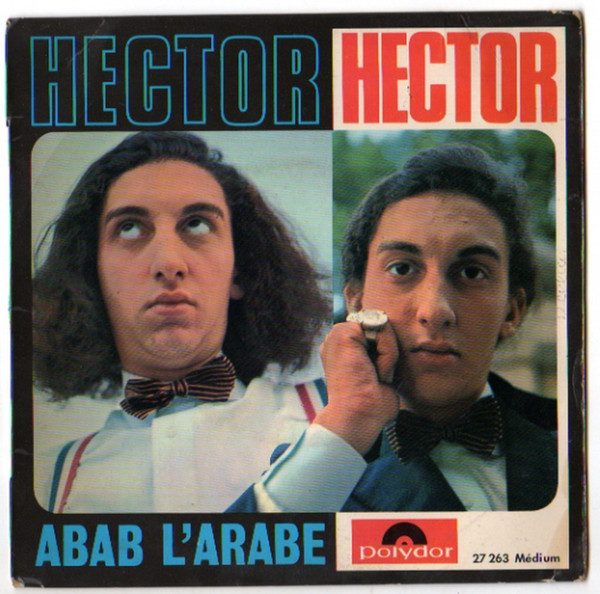
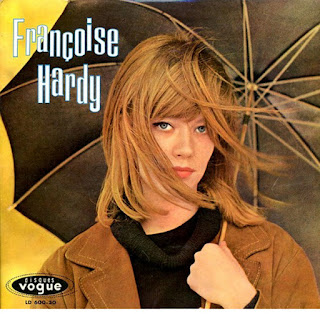
Comments
Post a Comment